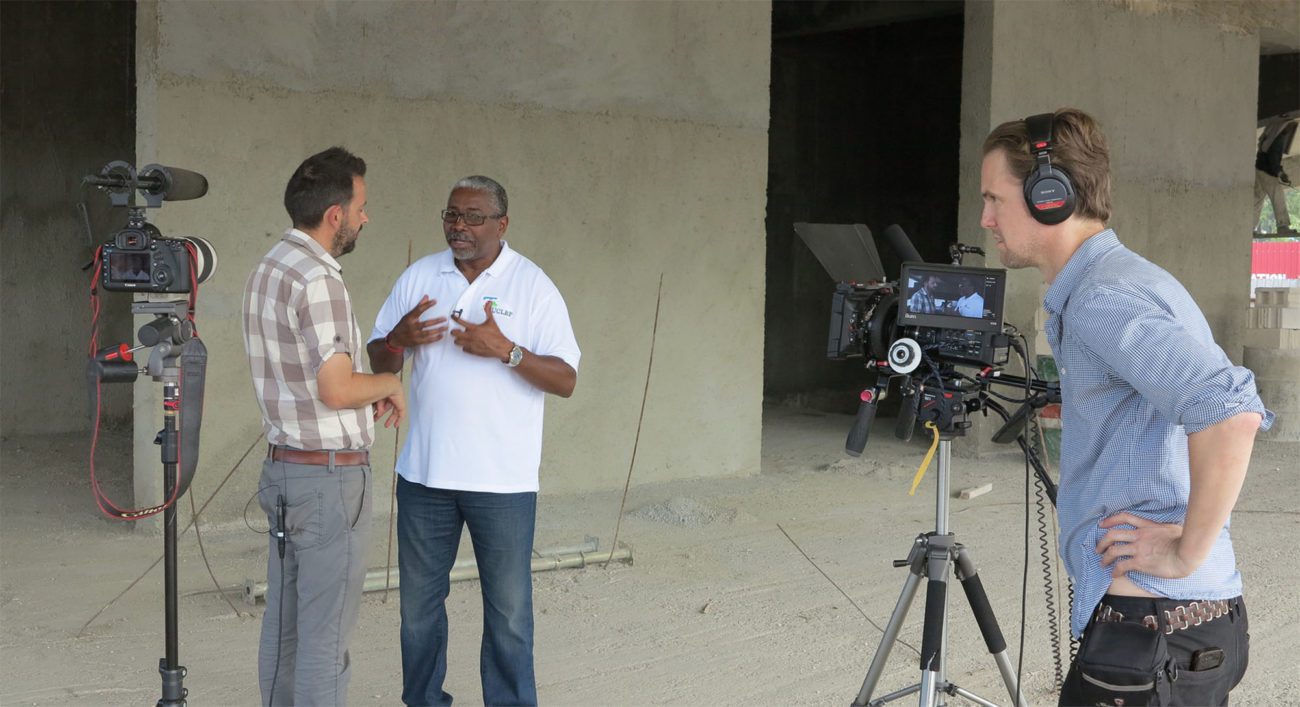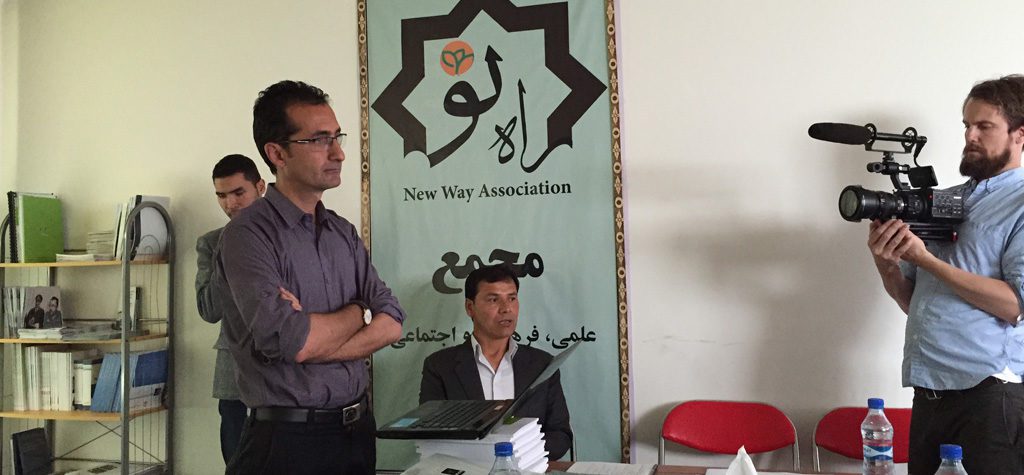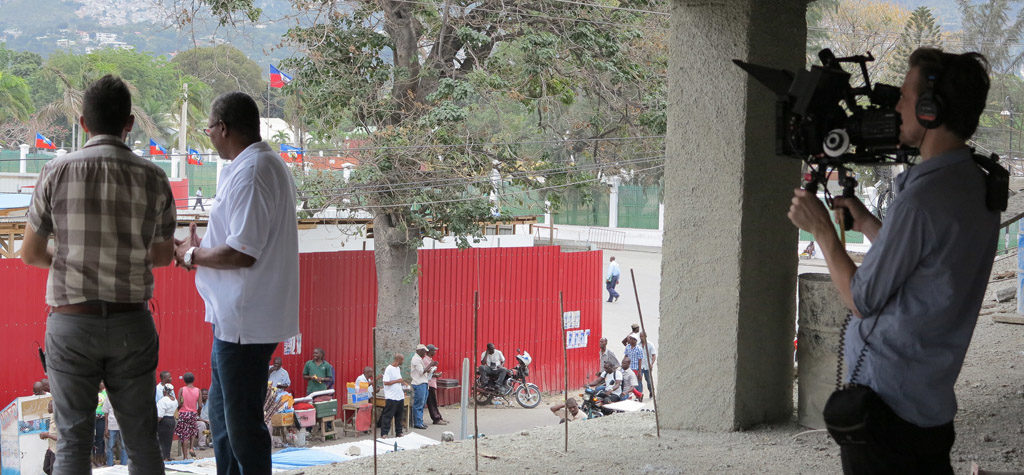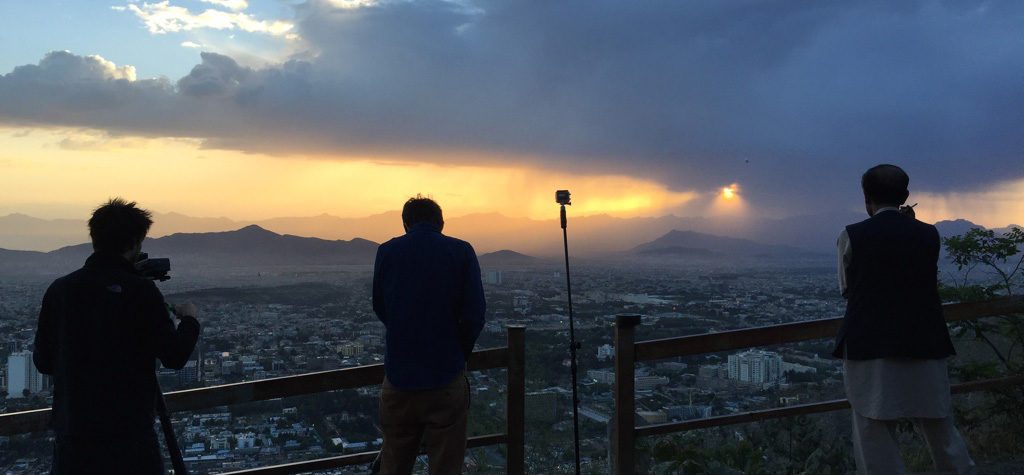
The future of documentaries with ‘Disaster Capitalism”s Thor Neureiter
When aid and politics meet business, who really gains from the global giving industry? This is the question director Thor Neureiter and writer Antony Loewenstein seek to answer in their latest documentary feature Disaster Capitalism. Weaving together a story that reveals the underbelly of the global aid and investment industry, the film is an eye-opening look at the way capitalism trickles through every avenue of the world at large.
Disaster Capitalism has proved a hit on the film festival circuit so far, with a warm reception on July 7 when it aired at this year’s Melbourne Documentary Film Festival. We at Film Daily were lucky enough to catch up with director Thor Neureiter to find out more about the film, his background, and the documentary filmmaking process in the era of fake news.
Film Daily: Could you tell us about your partnership with Antony Loewenstein and your inspiration behind Disaster Capitalism?
Thor Neureiter: Antony, whom I’d met through a mutual colleague, was on his way to Afghanistan to report for his book Profits of Doom, so I shared with him my experiences and insights on working in the country. It was during this initial conversation that we began discussing a collaboration. I was looking specifically into the potential of mining in Afghanistan, as it was being pushed by the US Department of Defense, while Antony was reporting on vulture capitalism (investors that acquire distressed firms in the hopes of making them more profitable so as to ultimately sell them for a profit) on a global scale.
Over the next few months, we agreed that there was a documentary to be made and Disaster Capitalism as a concept was born in the spring of 2012. In September of the same year, we travelled to Haiti for our first shoot.
Once you’d decided to make a film on this issue, what was the process from concept to completion, and how did the script and the movie evolve over time?
Documentary filmmaking by its very nature is an evolutionary process, especially those films that have a journalistic approach. We quickly decided that there was a global story to tell out of the situations in Haiti, Afghanistan, and Bougainville, Papua New Guinea. The way we approached the story in Haiti evolved the most over time, as we began using the lens of peasant agriculture to tell the story, but this shifted in the end to focus on housing. Overall, the biggest change was the inclusion of Antony into the film. This choice was made to give the film a narrator and guide to tie the three stories together. We thought Dirty Wars was a good example of how we could bring a really big and unwieldy topical story together.
What challenges did you face when it came to capturing the footage?

The challenges of shooting Disaster Capitalism were similar to what many documentary filmmakers face: time & money. We shot in each country twice, so every trip involved an intense shooting schedule in order to maximize our time during principle photography. Throughout the production, we operated with a crew of three for all but one shoot. This required that our producing and reporting ahead of each shoot had to be exceptionally thorough, and that planning made access less of an issue. But there are inherent security and safety concerns that added a layer of complexity to arranging the shoots.
From an environmental perspective, each country had its unique set of challenges because we were shooting outdoors 80% of the time, often filming in situations involving a combination of intense light, wind, dust, and rain. So that’s something we had to deal with when it came to capturing the footage.
We understand part of Disaster Capitalism was crowdfunded. With this in mind, what advice would you give to aspiring documentary filmmakers with regards to funding?
Fundraising is a hugely important component of independent documentary filmmaking; it’s also arguably the most difficult. Although it shouldn’t be the entire funding plan, crowdfunding is a useful tool and a good way to start building a film’s community. A successful campaign can cover costs to shoot the material to edit a pitch reel, which is essential to advance a more robust fundraising strategy.
Ultimately, filmmakers need backing from within the industry if they want to find an audience. Therefore, securing industry investors is also an essential component to a funding plan, as there is a level of validation that goes a long way when a film receives a grant or invitation to a prestigious pitching forum.
Would you say it’s possible to make an award-winning documentary on a shoestring budget?
Independent documentary films are continually made on a shoestring budget, but it’s an unsustainable approach – filmmakers need to pay themselves and raise the money to do so. There is very little money on the backend (if any), and if the industry is to remain healthy and continue to add more diverse voices, filmmakers need to value their worth. If not, the industry could easily return to a time when only those who are financially sound will be able to afford to make documentary films.
How can a writer and filmmaker maintain the truth in documentary filmmaking in the era of fake news?
I don’t have a direct answer to this issue, but I can provide my approach: Follow the facts and carry out solid reporting! What this means is to know your subject and issue inside out and know what the detractors – who are trying to blur the truth – think and the approaches they use. In this fake news era, there is a trap set to provoke arguments that defend facts and counter “whataboutism”, which ultimately distracts from unquestionable truths. Be knowledgeable and confident in your reporting and counter misleading statements with truths, not arguments.
Disaster Capitalism has been selected by a number of film festivals including the Melbourne Documentary Film Festival – did you expect such a positive reaction from the festival community?

We’ve had a number of screenings since March of this year and the reception has been great. We’re always looking for more avenues and locations to have the film seen and discussed – our goal is to use the film as a way to progress the discussion about international aid and investment and how to improve / change flaws in the system. Film festivals and broadcasts are powerful and exciting, but we continue to look for opportunities to have impact screenings – especially with aid practitioners and policymakers – to advance the conversations surrounding the issues raised in the film.
We understand you started off your career working for Ken Burns at Florentine Films. Could you tell us a bit about your background and why you got into documentary filmmaking?
The start of my career working for Ken Burns at Florentine Films is rooted in chance. I moved from Washington DC to New Hampshire on the hunch that documentary filmmaking would be my career path. Once in a New England house filled with bins of hanging 16mm film, Steenbeck flatbeds, and a bustling editing crew and group of producers, I quickly knew I was in the right place; it was an intoxicating atmosphere. Over the next two years, I moved from intern to assistant editor on the Jazz series, had the chance to work on two other films, and transitioned from editing to producing. It was like graduate school, as I was learning from some of the most talented editors and producers in the business and seeing the film process through to the end, including the meticulous process of mastering the 20-hour film to video.
From there, I moved to New York and worked as an AP on a documentary team at HBO, producing documentaries that explored the intersection of sports and society and how they helped shape one another. Knowing that my interest in historical documentary filmmaking was nearing its end, I sought out and started working for producers who were making films on contemporary issues for FRONTLINE on PBS. Those talented filmmakers (Raney Aronson-Rath, Greg Barker, and Ofra Bikel) introduced me to the journalistic side of documentary filmmaking, which is where I am today.
You’ve worked on a number of projects over the years – are there any that stand out to you?
My years at FRONTLINE revealed how serious this craft can be, and how important it is to be thorough and flexible every step of the way. When I was part of Raney Aronson-Rath’s (now executive producer of FRONTLINE) News War team, we were constantly aware that making a film about the intersection of politics and news left us open to fierce criticism from two very powerful and influential groups. With that in mind, we implemented an extraordinary level of verification and fact-checking. It included three independent primary sources for every line in the final script – narration and interview bites – and the content of every bit of archival and shot footage in the two-hour film.
And while working on Showdown with Iran for Greg Barker (The Final Year), we ended up producing two films in order to make one. This was during the Bush administration when the Iraq war was at its apex of violence and bloodshed, and in essence the proxy war with Iran. We were trying to get visas to shoot in Iran, and since we were on deadline, we produced the film as if we wouldn’t get access while awaiting an answer.
Once principle photography was nearing completion on that approach, our visas came through. We then shot for three weeks straight in Iran just two months before delivery. So then we had two films in the can. With those experiences, what stood out is that if one is to make a journalistic documentary, they have to be willing to go obsessively beyond what is expected to get the story right.
On an aside, my first producer credit was for Miracle in New York: The Story of the 1969 Mets. Not only was the documentary about my favorite sport and team, but it was awarded a New York Emmy for Best Documentary. That was a pretty wonderful combination and a standout moment in my career thus far.
You also teach at the Columbia Graduate School of Journalism. How do you juggle teaching and filmmaking?

Teaching at the Columbia Graduate School of Journalism has been an amazing experience, and one that I feel extremely fortunate about. Of course, for the past year, I have been focused professionally on finishing and distributing Disaster Capitalism. But it’s important to note that there’s a great atmosphere of encouragement to continue being a journalist while working at the school – it’s expected. Juggling the two hasn’t been so much of a challenge. In fact, thinking about the craft in such a focused manner has made me analyze my own approach to filmmaking more than before.
Our documentary specialization teaches every step in the process of making an independent film. To be successful in the industry today, filmmakers need to know more than simply how to shoot and edit a film; they need to know how to find and develop a compelling story and how to find characters to sustain that story. They also need to know how to craft an effective pitch and fundraising strategy, which includes identifying an audience and finding the platforms to reach that audience.
These are all things that I’m constantly thinking about, which makes teaching less like juggling and more like collaborating with a group of people who want to learn the craft. It’s very challenging, but also very rewarding.
Looking to the future, are there any other projects in the pipeline?
I’m currently in the early stages of putting together a series of shorts that look at the first two years of the Trump administration. The intended lens is looking at how this administration’s policies are shaping realities in the communities it has vowed to help. In other words, the Trump voter. Considering the burgeoning trade war and relentless crackdown on immigrants in the US, there is plenty of subtext that is ripe for reporting. Not to mention the promised yet ignored spending bill for infrastructure that is ailing across the country. Stay tuned!

